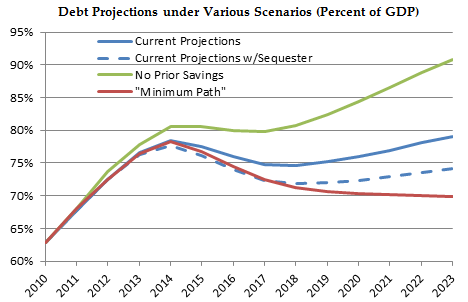Don't Put the Budget on the Back Burner
A recent Washington Post article, “As Red Ink Recedes, Pressure Fades for a Budget Deal,” suggests that a fall in the short term deficits may diminish the motivation for a budget deal. But this misses the main concern of our fiscal outlook. While the short-term outlook has improved somewhat, long-term debt projections are still unsustainable. The budget deficit in 2013 will be smaller than previous years, and it is projected to shrink further over the next few years. This is a welcome sign of the economy improving and enacted savings taking effect, but deficits and debt will rise again shortly because we have not come close to solving the problem. It makes little sense to wait to move closer to a solution. As a recent USA Today editorial put it, the White House and Congress have more to do before they break out the champagne.
Even with sequestration, debt is still a problem - while deficits will fall in the next few years, they will begin to rise again at the end of the decade. As we showed in Our Debt Problems Are Far From Solved, lawmakers have made some progress on our fiscal outlook by enacting roughly $2.7 trillion over ten years since FY 2011, when Washington began to focus on the debt problem. But lawmakers still need to find an additional $2.4 trillion in savings to put debt on a clear, downward path as a share for the economy. The projected decline in the deficit is contingent upon the nearly across-the-board “sequestration” spending cuts remaining in effect. Even assuming the blunt and abrupt cuts in sequestration remain in place, the debt would be 79 percent of GDP by 2023 and on an upward path once the economy recovers due to an aging population and health care cost growth.

Source: CRFB
Equally dangerous is the view that the projections of a temporary decline in the deficit allows us to hold off on enacting further deficit reduction for a few years. Preventing the debt from rapidly growing at the end of the decade will require controlling the growth of entitlement programs. If we act now, policymakers can put in place thoughtful reforms that can be phased in gradually. Delaying action will lead to a larger problem and require more drastic entitlement changes or a sharp increase in revenues.
By not pursuing a smart deficit reduction plan, lawmakers are wasting the opportunities that come with a comprehensive approach. Unlike the sequester, thoughtful and phased-in proposals can reduce fiscal drag in the near term and boost the economy, while achieving substantially more deficit reduction over the longer term. Tax reform can raise revenues and reduce the deficit, leading to less crowding out of investment, while boosting growth in its own right by reducing economic distortions and increasing incentives to work and invest.
There is danger with waiting until a debt ceiling fight to work toward a compromise. Tax and entitlement reform can provide real benefits, but this process will take time to work through. Rushing the legislative process is likely to produce less effective policies and budget gimmicks and, like in 2011, increase uncertainty. A better approach would be to agree to a framework now, so lawmakers can work out the details and implementation without having to race against the clock. The last debt ceiling fight led to a downgrade of the U.S. credit rating and a loss of market and household confidence, while leaving us with sequestration, an abrupt and mindless way to reduce the deficit. In fact, a Government Accountability Office report estimated the delaying the debt ceiling may have cost the Treasury Department $1.3 billion in higher borrowing costs. There is a better approach to achieve a bipartisan agreement.
At Tuesday’s Fiscal Summit, Senate Budget Chairman Patty Murray (D-WA) said that the American people were tired of managing by crisis, a sentiment with bipartisan support among many lawmakers in Washington. Senator Rob Portman reminded the audience that we don't lack the ideas, only the political will. Neither side is going to get exactly what it wants in a bipartisan deal, so it might be tempting for some to wait for a crisis to leverage their position. But this is irresponsible and against the wishes of many Americans. The conversation in Washington should be about what is best for the country, not about finding a political win. The budget fights over the last few years are evidence that we need to change our approach.